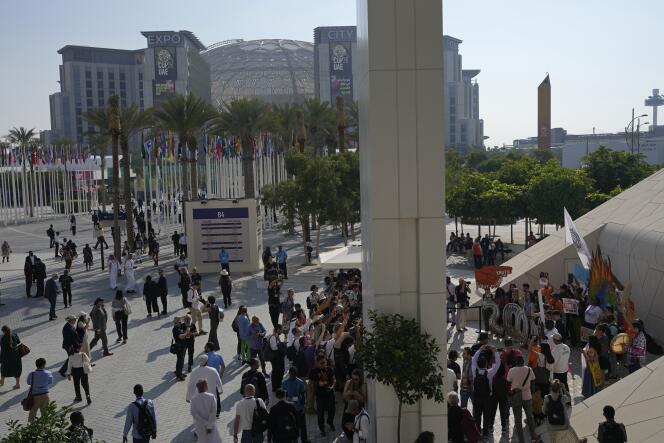


"I am committed to ensuring that this COP is inclusive and transparent," Sultan Al-Jaber, the president of the 28th United Nations World Climate Conference (COP28), has insisted. The event, ongoing since November 30 in Dubai, United Arab Emirates (UAE), is open to as many people as possible. Stretching over two and a half miles around a gigantic steel dome, the huge site of the 2020 World Expo is indeed packed to the rafters.
Representatives of indigenous peoples in traditional dress, youth organizations, delegates from all over the world and members of civil society can be seen wandering impeccable aisles and modern buildings. Human rights activists have been authorized to enter the country for the first time in years and a free visa has been introduced to facilitate the attendance of people from the Global South. The private sector is also abundantly represented. Of the 100,000 or so accredited attendees (at least twice as many as at COP27), almost 2,500 are fossil fuel industry lobbyists (four times as many as last year).
However, the conference is not fully booked: not a single environmental activist with UAE citizenship or residing in the country will be coming to speak. Human rights organizations fear that the total absence of local civil society will go unnoticed and that the country will take advantage of this COP edition to promote an image of tolerance and openness far removed from the ultra-repressive policies pursued within its borders.
"How can we talk about an inclusive COP in a country that doesn’t allow local NGOs and activists to express themselves freely," asked Katharina Rall, a researcher with the French branch of Human Rights Watch (HRW). "The Emirates have a strategy for passing themselves off as a state that respects freedom of expression, and it seems to be working with a number of governments." None of the 130 or so leaders who made the trip to Dubai have raised the subject publicly.
"These climate conferences should be inclusive, which is clearly not the case here," said Michel Forst, the UN special rapporteur on the protection of environmental defenders, who was also attending. "The green transition will not be effective if it takes place without climate activists."
The muzzling of dissident voices by Abu Dhabi’s autocratic regime began some 15 years ago. In 2013, 94 professors, students, engineers and lawyers were tried in a mass trial marred by irregularities, notably for having signed a pro-democracy petition. Several dozen were convicted and imprisoned. In 2017, the Emirati activist Ahmed Mansour, known as the country’s "last human rights defender," was in turn arrested and thrown in prison, where he remains in solitary confinement without a bed or books. "Silence has fallen on the Emirates," said Devin Kenney, UAE specialist at Amnesty International.
You have 55% of this article left to read. The rest is for subscribers only.
